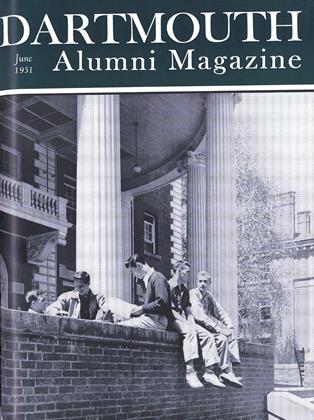Last month, just at press time, we were able to add the news that Dartmouth had been selected for one of the new Air Force ROTC units being activated on college campuses throughout the country. A few more details have since become known, particularly concerning the nature of the advanced training to be offered in Hanover. The AFROTC will offer two years of basic training, similar to the Army ROTC program also being inaugurated at Dartmouth next fall, and will then offer three options for the two years of advanced work. These options will be Flight Operations, with some fifty hours of primary flight training in the senior year; Comptrollership, of interest primarily to Tuck School men and business administration majors; and Administration and Logistics.
Lt. Col. John H. Veyette Jr., USAF, met with interested Dartmouth students on May 17 to explain the new Air Force program and announced a schedule of office hours in Bissell Hall on certain days throughout the rest of the semester, for the purpose of conferring with and enrolling qualified men. Students now at Dartmouth will have some opportunity of getting into the Air Force and Army units, but in both cases it appears that entering freshmen will provide the bulk of the ROTC enrollments.
The Commanding Officer of Dartmouth's Army ROTC unit has been named and has already reported to Hanover for his duties, entailing the faculty position of Professor of Military Science and Tactics. He is Lt. Col. William B. M. Chase, a West Point graduate of 1937, who served as an infantry battalion commander and with the Headquarters II Corps staff in Europe in World War 11, and who later was on duty in Washington with the War Department General Staff. In 1947 he was transferred from the Infantry to the Ordnance Corps, undertaking a year's industrial training with the Chrysler Corporation and then receiving the degree of Master of Business Administration from the University of Michigan in 1949. Prior to his Dartmouth assignment Colonel Chase was Chief of the Production Control Division and Director of the Records Service Division at the Ordnance Tank-Automotive Center in Detroit.
The two-year basic course (or its equivalent) that must precede advanced work in Ordnance under Colonel Chase will consist of general military training including drill, military organization, U. S. military policy, evolution of warfare, maps and aerial photographs, military psychology and personnel management, first aid and hygiene, geographical foundations of national power, military problems, mobilization and demobilization, and introduction to the tactics and techniques of the Ordnance Corps.
Students completing the advanced course will be commissioned Second Lieutenants in the Army Reserve Officers Corps. The number of deferments for each ROTC unit is based on a quota assigned by the Secretary of the Army. An ROTC student certified for deferral must agree in writing to serve two years on active duty as an officer upon completion of his college training if ordered to do so by the Secretary of the Army.
With both the Army and the Air Force units getting organized on the campus, a hundred and one details to be worked out, and everyone interested in just what effect the added units will have on the College in general and the students in particular, the developments on the ROTC front will continue to bulk large in Dartmouth news and will be very much to the fore when College opens in the fall.
 View Full Issue
View Full Issue
More From This Issue
-
 Class Notes
Class Notes1949
June 1951 By ROBERT H. ZEISER, DAVID S. VOGELS JR., JOHN F. STOCKWELL -
 Class Notes
Class Notes1918
June 1951 By ERNEST H. EARLEY, DONALD L. BARS, RICHARD A. HOLTON -
 Class Notes
Class Notes1929
June 1951 By F. WILLIAM ANDRES, EDWIN C. CHINLUND, GEORGE B. REDDING -
 Article
ArticleThe Senior Fellowships
June 1951 By EDWARD C. LATHEM '51 -
 Class Notes
Class Notes1940
June 1951 By ELMER T. BROWNE, DONALD G. RAINIE, FREDERICK L. PORTER -
 Class Notes
Class Notes1943
June 1951 By ELMER G. STEVENS JR., STANTON B. PRIDDY, THEODORE R. HOPPER
C. E. W.
Article
-
 Article
ArticleSUMMER SCHOOL
JUNE, 1907 -
 Article
ArticleCOUNCIL ON EDUCATION ANNOUNCES SCHOLARSHIPS
February, 1926 -
 Article
ArticleDartmouth War Directory
March 1944 -
 Article
ArticleSports Schedule
May 1962 By DAVE ORR '57 -
 Article
ArticleTuck School
June 1961 By GEORGE P. DROWNE JR. '33 -
 Article
ArticleGil Fernandez '33: a fine friend to the feathered
MAY 1986 By Georgia Croft








